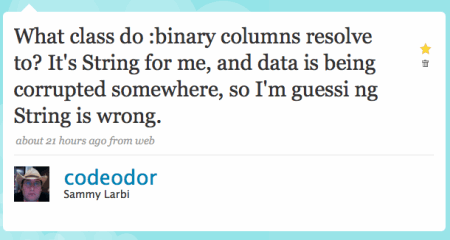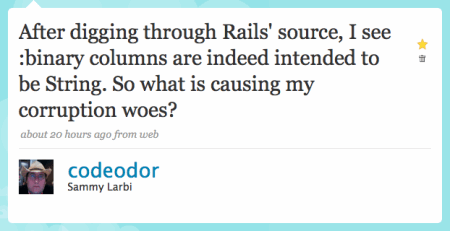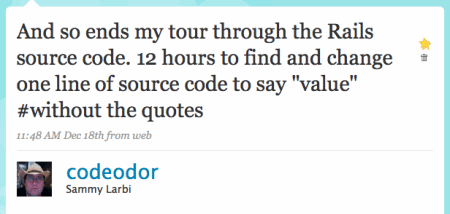This post might be better titled, "How (and how not) to help yourself when
Google doesn't have the answer: A whirlwind tour through Rails' source" if only I wasn't
too lazy to change the max length of the database field for titles to my blog entries.
Google sometimes seems as if it has the sum of all human knowledge within the confines of its search index.
It might
even be the case that it does. Even if you prefer to think that's true,
there may come a time when humanity does not yet have the knowledge you are seeking.
How often is that going to happen? Surely
someone has run up against the problems I'm
going to have, right? That hasn't been the case for me the last couple of months.
I may be the only developer writing Rails apps on MacOSX to be deployed to the world on Windows
where SQL Server 2008 is the backend to a Sharepoint install used by internal staff to drive the data. I'm
not so presumptious to think I'm a beautiful and unique snowflake, but I wasn't finding any answers.
Before I started this trek, I made a commitment to leave after an hour if I found my attention
drifting toward something else. I never started checking email, reading blogs, or obsessively reloading
twitter to see my tweeps latest tweets, so I thought I was in the clear.
However, even though I felt like I was focused, the fact that I had been sitting at the computer for so
long contributed to poor decision making. The first of these was to keep searching Google even though
every search was coming up useless. I always followed the path of least resistance - even
if it wasn't going to get me to the goal quicker than an alternative path. If it was less challenging,
it was for me.

After a while, I ran out of mentally casual paths and resigned myself to tracing through
the source code (it is open source, after all, and this is one of the benefits everyone claims but
so few practice). It was what I knew I should have been doing as I started out, and I had wasted
several hours trying to tip-toe around it for the sake of my poor, tired brain.

Now that I was sure I had the right data type being returned, I needed to narrow down where the problem was
occuring. I knew
SQLServerAdapter was using DBI to connect to the database, so I figured I'd use a
quick
irb session to test DBI itself. The test came back negative - DBI was getting the correct
data. I also ran a quick test in the Rails app, reaching through ActiveRecord::Base to use the connection
manually. That worked, as expected.

I had thought, and now confirmed, that the best place to look would be SQLServerAdapter.
If it were a Rails problem, certainly someone would have run into it by now. So it made sense the problem would be in the interface
between Rails and Microsoft.
Why? Because
if Rails is a Ghetto,
Rails with Microsoft products is a fucking concentration camp.
Excuse the profanity. I don't often use it here, so you know I must mean it when I do.
As I began to browse the source, I was first drawn to this
innocent looking code from rails-sqlserver on github:
class << self
def string_to_binary(value)
"0x#{value.unpack("H*")[0]}"
end
def binary_to_string(value)
value =~ /[^[:xdigit:]]/ ? value : [value].pack('H*')
end
end
But it wasn't obvious how it was being used elsewhere. I even tried using the reverse operations in my objects - to no avail.
And after searching in the source file, it certainly wasn't being called
inside of SQLServerAdapter.
So I went on a quest for the answer inside
/opt/local/lib/ruby/gems/1.8/gems/activerecord-2.1.1/
.
For quite some time I went back and forth inserting and removing debugging code between Active Record and
SQLServerAdapter.
select(sql, name=nil) is a protected method defined in the abstract connection
adapter in Active Record. SQLServerAdapter implements it privately, and it was both getting and returning
the correct data.
After ActiveRecord calls
object.instance_variable_set("@attributes", record) when instantiating our object,
object.attributes[binary].size becomes less than
record["binary"].size. That was
the problem. I thought for sure
instance_variable_set was a monkeypatched method on
Object,
and that all I needed to do was issue a monkeyfix and all would be well.
Only I was wrong. It's there by default in Ruby, and Rails wasn't monkeypatching it (that I can tell).
All the sudden things started looking bleak. By this time I knew how I could fix it as a hack. I even
had a nice little monkeypatch for my objects that I could issue and
have it feel less hacky to be used. I had given up.
But for some reason I picked it back up after an hour and found that ActiveRecord was actually calling
that string to binary method in SQL Server Adapter. It allows them to register calls that should happen before
defining the read and write methods on the object. Excellent!
I opened up SQLServerAdapater, there it was:
a different binary_to_string method
that totally explained it. The pair in this version were
encoding and decoding the data to/from base 64.
That would work fine, if my data was going through the encoding part. But it wasn't - it was coming straight
from Sharepoint.

There's a comment in the code about some arbitrary 7k limit on data size from SQL Server
being the reason for encoding as base 64 before inserting the data. I don't know about
inserting, but retrieving works fine without it. If I could think of a way to distinguish,
I'd submit a patch for the patchwork. Ideally, I'd rather find a way around the restriction, if it
actually exists.
The original code I was looking at was on github. It (not surprisingly) differed from the code in use on
my machine. Another side effect of the 16 hour monitor stare.
It's called the
8 hour burn for a reason.
The only things burning after 16 hours are your brain from all the stimulants and your
wife, wondering WTF you're really doing because there's no way you're working from before
she wakes up until after she goes to bed.
What's the point?
There's two, if you ask me:
-
You have the source code. Look through it. You have no other choice when no one has had your problem,
and you might
benefit by doing so even if someone already has.
-
Even when you think you're focused working late, and resolve to leave when you lose the focus, you're
still going to make stupid decisions that you won't notice until the morning. I turned
a 5 hour journey into a 12 hour marathon. Sleep, FTW.
Oh, and Rails on Windows is a concentration camp.
Hey! Why don't you make your life easier and subscribe to the full post
or short blurb RSS feed? I'm so confident you'll love my smelly pasta plate
wisdom that I'm offering a no-strings-attached, lifetime money back guarantee!